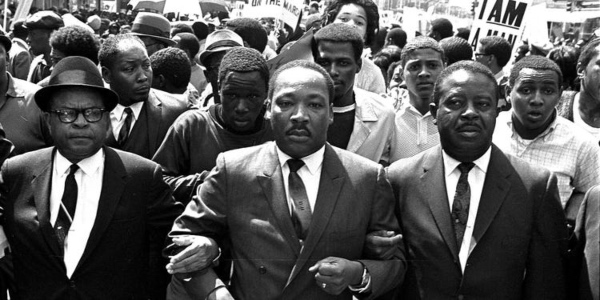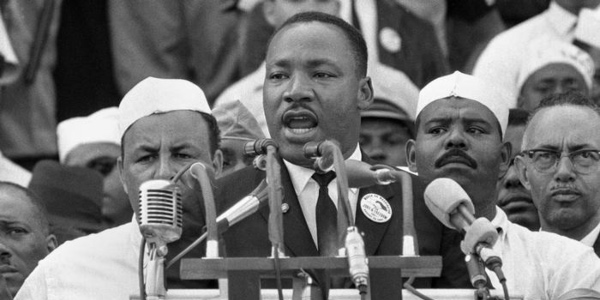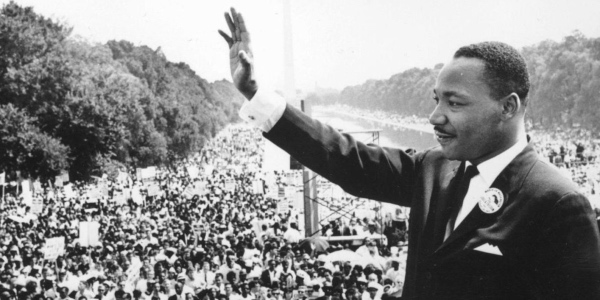NYFF 2020: MLK/ FBI
When looking back on history, there is a plethora of knowledge and perspectives that have still yet to be tackled. And only by truly seeing the entire picture can we understand the past and move forward with the future. Though, with racism, sexism, and oppression in place, many stories have remained untold and unknown to the masses. The power of cinema and television have responded to the call as of late, bringing these stories to life and to the masses, this year’s New York Film Festival selection MLK/ FBI from director Sam Pollard the latest to not only give a wider breadth of information on a man that changed a nation but on the deeply rooted systemic violence and racism within the government and authority of the United States we are still fighting today.
Martin Luther King Jr.
Based on the book The FBI and Martin Luther King, Jr.: From “Solo” to Memphis by David J. Garrow, the documentary does not begin with Martin Luther King Jr.’s early life, rather jumping right into the March on Washington, his “I have a dream” speech resonating through a crowd, the footage capturing the images we have all grown up with – eyes filled with hope, promise and ingenuity. From this moment, the FBI would consider Martin Luther King, Jr. the most dangerous black man in the nation – and until recently, no one truly knew to what extent.

We have all heard the story of Martin Luther King, Jr. We know the racism and the inequality he stood against. We know that much of where we are now would have never been possible if not for him. But, do we know the whole story? Do we know what threats lingered just below the surface, looking for the right opportunity to not only end a revolution but to destroy a man?
Using archived footage and photographs, MLK/ FBI quickly builds the intrigue, catering to our darkest desires of unearthing a scandal, and illuminating not only the devotion to a cause but the eternal loyalty to a man who gave his life so that others could live theirs as equally and free as possible. As the documentary plays out, it plays with your intrigue, your curiosity all while balancing the all-important focus on where the problems truly lied. Not on a man whose devotions in private life may have swayed, but rather on a man whose power inadvertently steered one of the most influential government agencies into darkness.
The racism of Hoover
MLK/FBI does an exemplary job of making this a Martin Luther King, Jr. vs. Hoover film, Black Lives Matter vs. the FBI, white vs black. The film focuses a great deal on J. Edgar Hoover – ironically as Martin Luther King, Jr. was becoming the face of the Black Rights movement, Hoover was rising at the same time as the face of the FBI – both men forever becoming synonymous with their causes. Maintaining an even pace from start to finish, MLK/ FBI starts with the FBI and Hoover’s war on communism.

Their investigations, and the means at which they carried them out, would unearth and follow many with communist ties and support – both proven and presumed. Once a communist supporter, always a supporter. With their watchful eyes and targeted ears, many would lose their privacy to the power and intrusion of Hoover’s Gmen of the FBI. And while they garnered support for their efforts to protect Americans from domestic and international terrors, their sights turned swiftly on a young charismatic preacher who had proven the ability to mobilize people.
Before the March on Washington, Hoover had already linked black people with communism, claiming that people of the black community were more susceptible to idiot ideology and easily persuaded. When it was discovered that Stanley Levinson, a former communist supporter, was advising King, the threat that Levinson’s agenda and propaganda would influence the leader, combined with the charisma and the ability to mobilize, presented a threat to America. While King did agree to distance himself from Levinson per pressure from the FBI, communication between the two continued in secret, Levinson becoming one of the most important figures of the Civil Rights movement, lingering just behind the curtain.

Even with wire taping on Levinson, and some of King’s associates, it wasn’t long before it became personal. Where originally they were after a potential supporter of the communist movement or was interacting with someone who had sympathy for communism, now they were out to destroy a man. At this moment, it was no longer fear about the rise and influence of communism but rather, as Hoover had famously said, a rise of the Black Messiah.
Conclusion: The Darkest History of the FBI
This is the most clearly painted element within the documentary and one that viewers are constantly reminded of. MLK/FBI is damning of the behaviors of the FBI and its treatment of not only the leader of a revolution but those that surrounded him, and the deeply rooted racism that still lingers. The Gmen of Hoover was revered by the public during their rise, yet their propaganda no longer reads true as perspectives of the past put into harsh light the decisions that created the agency – and ones that could still linger under the surface beyond the public eye.
By the film’s end, we know how it is going to end. What viewers will find truly shocking is the depths the FBI was willing to go to not only destroy King but to have him gone completely. As the final pieces of the past are revealed, the documentary has built itself carefully and expertly to this point, exploding into a moment of realization.
While there is a fear that the future release of recordings could be a threat to the memory of King, there is a hopefulness that the sacrifice of a leader will not be forsaken. As we look at the violence and systemic racism in the justice system of the United States, you will find yourself questioning not what could be on those tapes, but rather how deep does the hate and the racism still go.
Watch MLK/FBI
Does content like this matter to you?
Become a Member and support film journalism. Unlock access to all of Film Inquiry`s great articles. Join a community of like-minded readers who are passionate about cinema – get access to our private members Network, give back to independent filmmakers, and more.
Join now!





